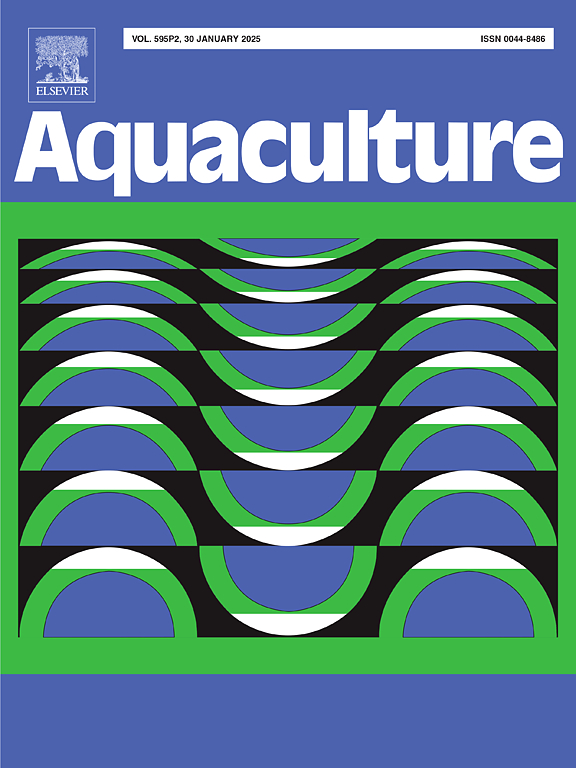梣酮是一种很有前景的控制白斑综合征病毒的天然制剂:机理认识和应用潜力
IF 3.9
1区 农林科学
Q1 FISHERIES
引用次数: 0
摘要
在全球甲壳类水产养殖业快速发展和养殖环境日益复杂多变的背景下,白斑综合征病毒(White Spot Syndrome Virus, WSSV)已成为该行业的主要瓶颈,白斑病(White Spot Disease, WSD)每年造成重大的经济损失。然而,目前缺乏对这种高传染性病毒性疾病的有效控制策略。本研究的重点是天然药用资源的开发和鉴定。从20种中草药中发现WSSV增殖的有效抑制剂。其活性化合物黄曲霉素具有良好的抑制作用(97.29%,75 mg/kg)。进一步研究表明,黄曲素能以浓度依赖的方式有效减少病毒复制,下调病毒基因转录水平,显著提高感染WSSV的小龙虾的存活率。此外,在预防/治疗给药和静态同居模型中,fraxetin有效地抑制病毒载量并阻断WSSV的水平传播,表明其作为广谱控制策略的潜力。从机制上讲,卵黄蛋白最初会干扰在启动WSSV转录中起关键作用的病毒基因的表达。它还削弱了病毒基因劫持先天免疫信号通路的能力,从而破坏了病毒复制周期。此外,黄曲霉素还能调节多种酶活性,有效平衡WSSV感染引起的氧化应激和炎症损伤,促进蛋白质稳态的恢复,增强其在小龙虾体内的抗病毒作用。鉴于卵黄蛋白的生物合成基础已经建立,本研究为其作为控制WSSV爆发的有效候选物提供了坚实的理论基础,有望为水产养殖业的可持续发展做出重大贡献。本文章由计算机程序翻译,如有差异,请以英文原文为准。
Fraxetin as a promising natural agent for controlling white spot syndrome virus: Mechanistic insights and application potential
Against the backdrop of the rapid growth of the global crustacean aquaculture industry and the increasingly complex and variable farming environments, White Spot Syndrome Virus (WSSV) has emerged as a major bottleneck in the industry, causing White Spot Disease (WSD) and resulting in significant economic losses annually. However, effective control strategies for this highly contagious viral disease are currently lacking. This study focuses on exploring natural medicinal resources and identifies Fraxinus chinensis Roxb. from 20 medicinal herbs as an effective inhibitor of WSSV proliferation. Its active compound, fraxetin, demonstrated excellent inhibitory effects (97.29 %, 75 mg/kg). Further studies have shown that fraxetin can effectively reduce viral replication in a concentration-dependent manner, downregulate viral gene transcription levels, and significantly increase the survival rate of crayfish infected with WSSV. Additionally, in both preventive/therapeutic administration and static cohabitation models, fraxetin effectively suppresses viral load and blocks horizontal transmission of WSSV, demonstrating its potential as a broad-spectrum control strategy. Mechanistically, fraxetin initially interferes with the expression of viral genes that play a crucial role in initiating WSSV transcription. It also weakens the viral genes' ability to hijack innate immune signaling pathways, thereby disrupting the viral replication cycle. Furthermore, fraxetin modulates various enzyme activities, effectively balancing oxidative stress and inflammatory damage triggered by WSSV infection, promoting the restoration of protein homeostasis, and enhancing its antiviral efficacy within crayfish. Given the established biosynthetic basis for fraxetin, this study provides a solid theoretical foundation for its use as an effective candidate to control WSSV outbreaks, promising significant contributions to the sustainable development of the aquaculture industry.
求助全文
通过发布文献求助,成功后即可免费获取论文全文。
去求助
来源期刊

Aquaculture
农林科学-海洋与淡水生物学
CiteScore
8.60
自引率
17.80%
发文量
1246
审稿时长
56 days
期刊介绍:
Aquaculture is an international journal for the exploration, improvement and management of all freshwater and marine food resources. It publishes novel and innovative research of world-wide interest on farming of aquatic organisms, which includes finfish, mollusks, crustaceans and aquatic plants for human consumption. Research on ornamentals is not a focus of the Journal. Aquaculture only publishes papers with a clear relevance to improving aquaculture practices or a potential application.
 求助内容:
求助内容: 应助结果提醒方式:
应助结果提醒方式:


